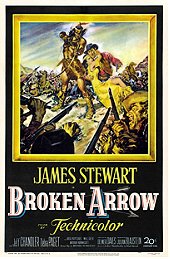BROKEN ARROW, 20th Century Fox, 1950.
Dir. Delmer Daves, Perf. James Stewart, Jeff Chandler, and Debra Paget.
Review by Dominic
Largely exchanging carnage between settlers and Native Americans for conversation, Delmer Daves’s Broken Arrow has aged gracefully in its treatment of race relations where so many of its contemporaries appear (their other merits aside) offensively grizzled.
Riding across the desert to Tucson, level-headed prospector Tom Jeffords (Stewart) encounters a dying Apache boy, and, rather than partake in the ten-year war between the Apache and the Tucson settlers by killing him, nurses him to recovery. Later, having learned the rudiments of Apache language and custom, Jeffords negotiates with their leader, Cochise (Chandler), to allow mail-carriers to pass through the area unharmed as a first step toward peace. Jefford’s openness to discussion with their antagonists, however, leaves the Tucson townsfolk suspicious of him, and his loyalty is aggressively questioned in the face of ongoing settler casualties in the conflict with the Natives.
Daves’s film is too long on talk and too short on action to appeal to all viewers, but has a great deal to offer through its implication that there might be as much intrigue in Native Americans and settlers exploring each other’s culture as killing each other. Broken Arrow eschews mythic conceptualizations of settlement that justified violence against the Natives, and even though the majority of the Indians are played by white actors, they are admirably and diversely represented. While the film is still narrated from a white perspective, it affords its Native American characters real humanity, and resists the urge to tokenistically flatter their culture by over-romanticizing it.
Unlike many Westerns, in Broken Arrow the Natives neither exist nor act as a simple, homogenous group, and winning the favor of one Indian does not ensure the favor of all of them. Through a High Noon-like scene in which his fellow tribesmen abandon Cochise, the film demonstrates that Indian politics are as complicated as those of the settler societies. Somewhat less convincing is a run-of-the-mill love story involving Jeffords and an Indian maiden, which serves to unnecessarily emphasize cultural conflict and Jeffords’s position between worlds.
Stewart’s performance is typically strong, although without the psychological edginess of his greatest Western roles. The film is also retrospectively narrated by his character, although this seems unnecessary and overrides our engagement with his performance on-screen. This is not the only way in which dialogue troubles Daves’s film. We are informed early on that the story presented is true but that in this enactment the Indians will speak in English. While the viewer may be willing to suspend disbelief here, the film itself seems unsure of the validity of this move and the initial dialogue between Native and settler is awkwardly self-conscious.
Broken Arrow’s conclusion is dramatically flatter than expected, but remains challenging in its refusal to provide excitement by leaning back on straight-forward hero/villain roles. Even more challenging is its simple yet powerful assertion that past wrongs must sometimes be accepted rather than avenged if progress is to occur.
10/10
 Login
Login